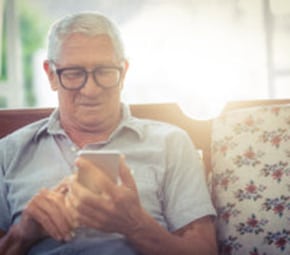Although some may think that seniors are unable to learn the new technology of today, this could not be further from the truth. In fact, many seniors are embracing the new world of technology with open arms. Many of our residents use technology like Rokus to watch Netflix, Hulu, sports, or other programs whenever they’d like. You don’t have to be in assisted living to take advantage of some of the technology options below, but we can accommodate seniors interested in access to any of these innovations.
Technology has helped improve many seniors’ quality of life by helping them to socialize and continue learning. Here are a few ways that new tech has helped improve the lives of those in assisted living facilities:
- Skype and FaceTime – Both of these technologies have helped to increase the socialization of seniors with their friends and family. As close to face-to-face communication as possible, Skype and FaceTime make talking to long-distance loved ones simple and easy. They can even help seniors virtually “attend” events or occasions that they would otherwise miss out on!
- Tablets – A tablet computer can open a whole new world of possibilities for seniors. From brain-training games to Facebook and fitness apps, a tablet can have quite a positive impact. These devices are lightweight compared to laptops and feature easy-to-use touch screens, as well as accessibility settings (such as larger fonts) to accommodate the needs of seniors.
- Wi-Fi – The wireless internet revolution has totally changed the way that people of all ages can access the web. Users are no longer chained to a wire-riddled desktop computer and instead have freedom and mobility. Assisted living residents who are physically limited can now use the internet on their own terms and where they are able, whether it be from bed or laying down.
- Videogames – It may sound surprising, but videogames have actually been shown to improve mental agility and cognitive abilities. They can also promote social interaction and sometimes even physical health.
- Improved Televisions – The TVs of today have come eons from where they began. This progress has not only meant improved picture and sound quality, but also accommodations for those with disabilities or limitations. Seniors with hearing or vision loss can now have the sound levels and larger picture adjusted to meet their needs.
The technological advances of today have helped to enrich the lives of seniors in assisted living in many ways. For information on assisted living at Angels Senior Living, please contact us at (877) 480-2244 today!






